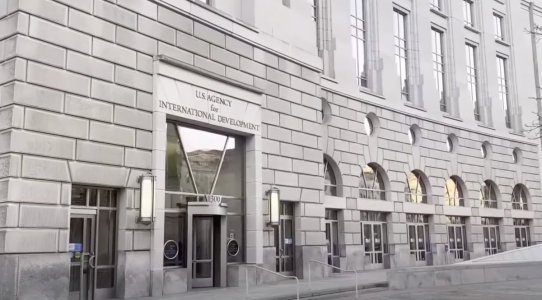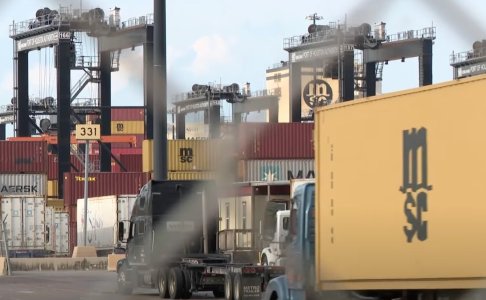How a government decision could lead to the loss of $500 million in food aid—and what you can do
By
Veronica E.
- Replies 0
A recent report points out that nearly $500 million worth of food aid may spoil due to a pause in funding for the U.S. Agency for International Development (USAID).
The delay in distribution poses a risk of significant losses, impacting the aid intended for vulnerable populations.
Additionally, the disruption could affect US agricultural producers who supply much of this aid.
How does this situation affect aid distribution, and what measures can be taken to ensure it reaches those in need?
Let’s take a closer look at the details and explore possible actions to address this situation.

According to a report from USAID's inspector general, approximately $489 million worth of food aid is currently delayed in the distribution process.
This includes food that is stored at ports, in transit, or in warehouses, all of which are at risk of spoilage. If not distributed soon, this could result in losses and missed opportunities to provide aid.
An additional 500,000 metric tons of food, such as wheat, soybeans, sorghum, and split peas, is either waiting to be shipped or already in transit.
This food is sourced from US farmers, who are also affected by the pause in USAID funding, leading to disruptions in both the aid process and the agricultural market.
USAID plays a key role in supporting both US farmers and international aid efforts. Historically, about 40% of the food aid provided to countries in need comes from American producers.
With the current funding pause, US farmers, especially those in agricultural regions like Kansas, are uncertain about the fate of their crops and their income.

Humanitarian organizations, such as the Norwegian Refugee Council, have raised concerns about the funding delay, highlighting the risk it poses to their relief operations.
Programs that provide food, clean water, and other essential services to vulnerable populations in various countries may be impacted.
The decision to pause funding for USAID is part of broader efforts to reduce government spending, including on foreign aid. While some have raised concerns about the agency's efficiency, USAID is involved in various global health, poverty reduction, and human rights initiatives, which are important to consider.
Founded in 1961, USAID has been involved in international humanitarian efforts, and the potential impact of reduced funding raises questions about balancing fiscal efficiency with the responsibility to assist vulnerable populations.
There are steps that can help address this situation:
The situation with USAID funding highlights the delicate balance between government spending and humanitarian needs.
By staying informed and taking action, we can work together to ensure that vital aid reaches those who need it most, while also supporting US farmers and global relief efforts.

Here at The GrayVine, we believe in the importance of community dialogue. Have you been impacted by the funding pause at USAID? Do you have suggestions for addressing this issue? We invite you to join the conversation below and share your thoughts.
Related Articles:
Top USAID security chiefs ousted for blocking Elon Musk's DOGE team's access
Trump's plans for America—What will change now that he’s president?
The delay in distribution poses a risk of significant losses, impacting the aid intended for vulnerable populations.
Additionally, the disruption could affect US agricultural producers who supply much of this aid.
How does this situation affect aid distribution, and what measures can be taken to ensure it reaches those in need?
Let’s take a closer look at the details and explore possible actions to address this situation.

USAID's humanitarian efforts are at risk due to a pause in funding, potentially affecting food aid and global relief programs. Image Source: YouTube / KHOU 11.
The Stalled Shipments: A Closer Look at the Numbers
According to a report from USAID's inspector general, approximately $489 million worth of food aid is currently delayed in the distribution process.
This includes food that is stored at ports, in transit, or in warehouses, all of which are at risk of spoilage. If not distributed soon, this could result in losses and missed opportunities to provide aid.
An additional 500,000 metric tons of food, such as wheat, soybeans, sorghum, and split peas, is either waiting to be shipped or already in transit.
This food is sourced from US farmers, who are also affected by the pause in USAID funding, leading to disruptions in both the aid process and the agricultural market.
The Ripple Effect: Farmers, Foreign Aid, and the Fight Against Hunger
USAID plays a key role in supporting both US farmers and international aid efforts. Historically, about 40% of the food aid provided to countries in need comes from American producers.
With the current funding pause, US farmers, especially those in agricultural regions like Kansas, are uncertain about the fate of their crops and their income.

Containers holding food aid, now at risk of spoilage due to delays in distribution and funding. Image Source: YouTube / KHOU 11.
Humanitarian organizations, such as the Norwegian Refugee Council, have raised concerns about the funding delay, highlighting the risk it poses to their relief operations.
Programs that provide food, clean water, and other essential services to vulnerable populations in various countries may be impacted.
The Bigger Picture: Efficiency vs. Humanitarian Impact
The decision to pause funding for USAID is part of broader efforts to reduce government spending, including on foreign aid. While some have raised concerns about the agency's efficiency, USAID is involved in various global health, poverty reduction, and human rights initiatives, which are important to consider.
Founded in 1961, USAID has been involved in international humanitarian efforts, and the potential impact of reduced funding raises questions about balancing fiscal efficiency with the responsibility to assist vulnerable populations.
Also read: Elon Musk takes aim at government spending: What it means for Medicare and Medicaid benefits
Taking Action: What Can Be Done?
There are steps that can help address this situation:
- Expedite the Review Process: A quicker review of USAID programs could help facilitate the release of funds and ensure more timely distribution of aid.
- Engage with Lawmakers: Citizens may contact their elected representatives to voice concerns and discuss the importance of maintaining USAID funding to support aid efforts.
- Support Other Aid Organizations: Consider supporting other organizations involved in humanitarian efforts that may be working to address the challenges posed by the funding delay.
The situation with USAID funding highlights the delicate balance between government spending and humanitarian needs.
By staying informed and taking action, we can work together to ensure that vital aid reaches those who need it most, while also supporting US farmers and global relief efforts.
Key Takeaways
- Almost $500 million in food aid is at risk of spoilage due to a pause in USAID funding under the previous administration.
- The USAID inspector general report highlighted concerns about the safeguarding and distribution of $8.2 billion in unspent humanitarian aid.
- US farmers, including sorghum producers, have raised concerns about the impact of the funding pause on the market for their products.
- The Norwegian Refugee Council has described the US funding cutoff as the most devastating in its history, affecting programs in 20 countries.
Here at The GrayVine, we believe in the importance of community dialogue. Have you been impacted by the funding pause at USAID? Do you have suggestions for addressing this issue? We invite you to join the conversation below and share your thoughts.
Related Articles:
Top USAID security chiefs ousted for blocking Elon Musk's DOGE team's access
Trump's plans for America—What will change now that he’s president?






